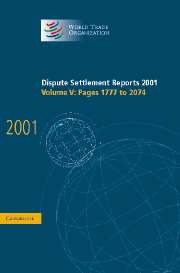Book contents
- Frontmatter
- Contents
- Argentina - Measures Affecting the Export of Bovine Hides and the Import of Finished Leather (WT/DS155): Report of the Panel
- United States - Anti-Dumping Act of 1916 (WT/DS136/11, WT/DS162/14): Award of the Arbitrator under Article 21.3(c) of the DSU
- Canada - Term of Patent Protection (WT/DS170/10): Award of the Arbitrator under Article 21.3(c) of the DSU
- European Communities - Anti-Dumping Duties on Imports of Cotton-Type Bed Linen from India (WT/DS141): Report of the Appellate Body
European Communities - Anti-Dumping Duties on Imports of Cotton-Type Bed Linen from India (WT/DS141): Report of the Appellate Body
Published online by Cambridge University Press: 13 December 2017
- Frontmatter
- Contents
- Argentina - Measures Affecting the Export of Bovine Hides and the Import of Finished Leather (WT/DS155): Report of the Panel
- United States - Anti-Dumping Act of 1916 (WT/DS136/11, WT/DS162/14): Award of the Arbitrator under Article 21.3(c) of the DSU
- Canada - Term of Patent Protection (WT/DS170/10): Award of the Arbitrator under Article 21.3(c) of the DSU
- European Communities - Anti-Dumping Duties on Imports of Cotton-Type Bed Linen from India (WT/DS141): Report of the Appellate Body
Summary
INTRODUCTION
The European Communities and India appeal certain issues of law and legal interpretations in the Panel Report, European Communities - Anti-Dumping Duties on Imports of Cotton-Type Bed Linen from India (the “Panel Report”). The Panel was established to consider a complaint by India with respect to definitive anti-dumping duties imposed by the European Communities on imports of cotton- type bed linen.
On 13 September 1996, the European Communities initiated an antidumping investigation into certain imports of cotton-type bed linen from, inter alia, India. The European Communities made its preliminary affirmative determination of dumping, injury and causal link on 12 June 1997, and imposed provisional anti-dumping duties with effect from 14 June 1997. The European Communities made its final affirmative determination of dumping, injury and causal link on 28 November 1997, and imposed definitive anti-dumping duties with effect from 5 December 1997. The factual aspects of this dispute are set out in greater detail in the Panel Report.
The Panel considered claims by India that, in imposing the anti-dumping duties on imports of cotton-type bed linen, the European Communities acted inconsistently with Articles 2.2, 2.2.2, 2.4.2, 3.1, 3.4, 3.5, 5.3, 5.4, 12.2.2, and 15 of the Agreement on Implementation of Article VI of the General Agreement on Tariffs and Trade 1994 (the “Anti-Dumping Agreement”).
In its Report, circulated to Members of the World Trade Organization (the “WTO”) on 30 October 2000, the Panel concluded that:
… the European Communities did not act inconsistently with its obligations under Articles 2.2, 2.2.2, 3.1, 3.4, 3.5, 5.3, 5.4, and 12.2.2 of the AD Agreement in:
(a) calculating the amount for profit in constructing normal value (India's claims 1 and 4),
(b) considering all imports from India (and Egypt and Pakistan) as dumped in the analysis of injury caused by dumped imports (India's claims 8, 19, and 20),
(c) considering information for producers comprising the domestic industry but not among the sampled producers in analyzing the state of the industry (India's claim 15, in part),
(d) examining the accuracy and adequacy of the evidence prior to initiation (India's claim 23),
(e) establishing industry support for the application (India's claim 26), and
(f) providing public notice of its final determination (India's claims 3, 6, 10, 22, 25 and 28).
- Type
- Chapter
- Information
- Dispute Settlement Reports 2001 , pp. 2049 - 2074Publisher: Cambridge University PressPrint publication year: 2004
- 1
- Cited by



